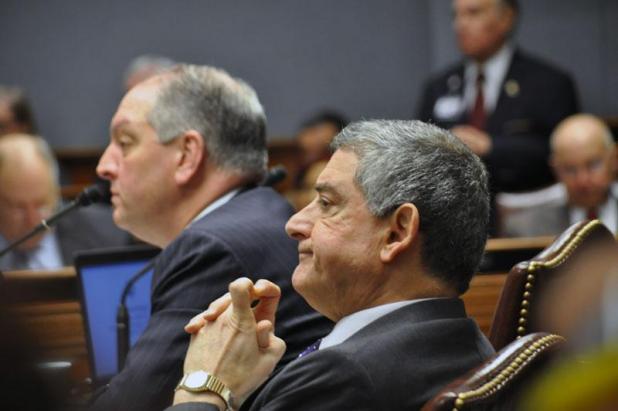
PHOTO by Sarah Gamard
Gov. John Bel Edwards and Commissioner of Administration Jay Dardenne (forefront) presented the governor’s budget proposal for fiscal 2019 to a joint legislative committee on Monday.
Governor delivers doomsday budget; TOPS, health care cut
BATON ROUGE — Baton Rouge’s rainy weather mirrored the gloom inside the Capitol Monday, as Gov. John Bel Edwards presented a 2019 doomsday budget with deep cuts in the popular TOPS college scholarship program and in state health services that he said he hopes never go into effect.
Under his proposal, TOPS would be gutted, losing all $233 million in state general funds, while the budget for higher education institutions would be slashed by $272 million. The Department of Health and Hospitals, which oversees the state’s Medicaid program and hospitals, would suffer a $488 million cut in state funding and ultimately lose $2.3 billion once federal matching funds are factored in.
“There’s not a cut in that budget proposal that I’m advocating for,” the governor said when presenting his proposal to the Joint Legislative Committee on the Budget. “Not a single one.”
The budget calls for a $6 million cut at the Department of Agriculture and Forestry, just over 24 percent of its general fund allocation. The proposal also includes a $3 million cut from the office of the governor’s longtime Republican rival, Attorney General Jeff Landry, $13.8 million from juvenile justice services and all $19 million from public safety services.
While money for public safety was stripped from the general fund budget, the administration proposed a fee increase to make up most of the lost dollars, leaving a $5 million cut overall.
Despite major cuts, several key areas, including the Department of Veterans Affairs, the Department of Children and Family Services and most of K-12 education, were spared.
The governor said he was forced to propose the cuts because a temporary one percent increase in the state sales tax, implemented in 2016, will expire in July, stripping the state budget of roughly $1 billion in discretionary spending.
While Democratic legislators were sympathetic to Edwards’ proposal, some Republican lawmakers were not convinced that the governor had looked hard enough for other possible cuts that might have less impact.
“I think there are more opportunities on the expense side,” Sen. Sharon Hewitt, R-Slidell, said at the budget committee hearing. “I don’t think you’ve spent the time honestly looking at our expenses. I believe there are other opportunities to reduce the budget, and I would appreciate if you would take the time to drill down and look at those.”
Republican leaders have not said much so far on what kind of fiscal reform members they would support.
Edwards, Louisiana’s only statewide-elected Democrat, told reporters over the weekend that House Speaker Taylor Barras had not told him which suggestions Republicans might be willing to back. Edwards said he expects to see a “fleshed-out” proposal from Barras before the end of the month.
The governor said that he, Barras and Senate President John Alario, R-Westwego, are in agreement that they need to hold a special session in February. Edwards said he viewed that as the “most responsible” option, but he has said he is reluctant to call one if he and the GOP leaders cannot reach a consensus.
Whether a special session will start just after Mardi Gras depends on the two sides reaching an agreement. Edwards has already called four grueling special sessions over his two years as governor, and lawmakers are weary of entering another special session if their efforts might be fruitless.
“I’m not in favor of spending $60,000 a day for us to go in to have conversations about bills and then end up having them go soft,” House Appropriations Committee member Rep. Pat Smith, D-Baton Rouge, said late last week. “I would prefer to see us at least have something on the table.”
State law precludes the legislature from approving revenue-raising measures during even numbered years Without a special session to solve the fiscal problems, legislators will have to exact deep cuts to state services during the regular legislative session that begins in March..
A special session following the adjournment of the regular session in June also is possible. But the tight turnaround would leave state agencies and universities with little time to make adjustments before their budgets take effect July 1.
Edwards told the joint budget committee Monday that he is not in favor of a June special session.
“Let’s prove that we are not Washington,” Edwards said, referring to Congress’ failure to reach an agreement on its own budget last Friday, resulting in a federal government shutdown. He insisted to the joint committee that, despite critics’ claims, he was not using fear tactics, and that he was “confident” that no legislator will want his budget proposal to become reality.
“Tell me what aspects of my plan you can live with, and for the parts you can’t, bring me your own plan,” Edwards said. “I cannot negotiate with myself. It doesn’t work that way.”
The governor added: “There’s still time to come together and responsibly get this done. We can do this."
